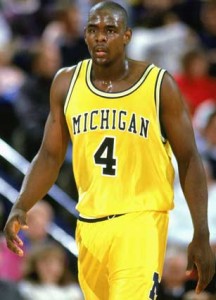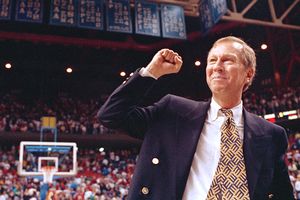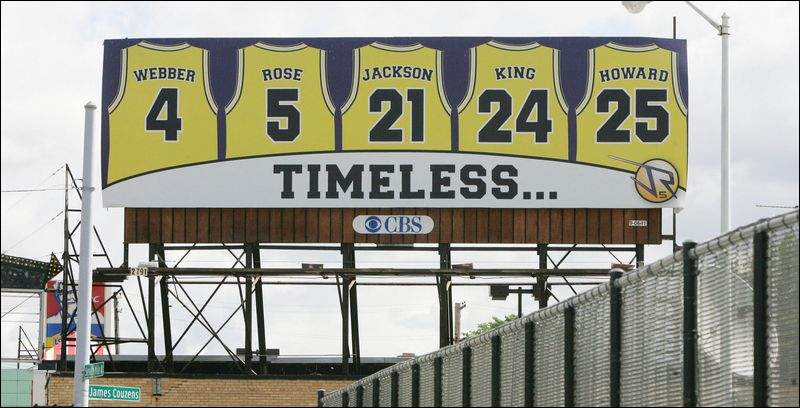
Past Imperfect is a series focusing on the history of the game. Each week, RTC contributor JL Weill (@AgonicaBoss | Email) highlights some piece of historical arcana that may (or may not) be relevant to today’s college basketball landscape. This week: Michigan’s revolutionary Fab Five.
We fear change. Change can be unannounced, even unwelcome. Or, sure, sometimes we may ask for it, beg for it, look to the heavens for it. But however it comes, when it actually does come, change straight freaks us out. Whether it’s something as small as a job change, as defining as a new child or as big as the first black president, change is maybe the most aggravating salvation there is. Because we curse and are disappointed by that which we once sought and rue the day we begged for what we now fear. So we then ask for change from our change.
In 1991, college basketball was ascendant. Fans were tuning into the annual tournament in record numbers, new modes of media were creating a whole new spectacle out of the Final Four and it was a age before the annual exodus of underclassmen to the pros. This meant that teams were both NBA talented and upperclassmen experienced, and the play on the floor showed that. The tournaments in the last half-decade of the 1980s seemed ever-increasingly better. It was a Golden Age for college hoops. No one was particularly asking for things to get shuffled around.
But you can’t always predict when things will change. And in the fall of 1991, change came to college basketball in the form of five supremely talented freshmen. In particular, five supremely talented freshmen came to the same place at the same time. And with them came change without ever being asked for. Or, rather, it snuck up on everyone. All Michigan coach Steve Fisher was looking for was a change in the fortunes of his basketball team. Two years removed from redefining “interim coach” by winning six straight games and the 1989 national title, Fisher’s team had struggled its way to a losing mark, lacking star power. Michigan needed players, so Fisher went out and got the five best he could get. They just so happened to also be five of the best in the whole country.

- Chris Webber was the jewel of the golden ’91 Fab Five class.
Two of them were no brainers, local wunderkinds Fisher — or whomever would have been the Michigan coach — had to lock in. Chris Webber was the nation’s best high school senior: the MVP of the McDonald’s All-American game and a three-time Michigan state champion at Detroit Country Day. Webber was the biggest of the big-time. Michigan had to make sure he was heading to Michigan. There was nothing wrong with Webber; he was the kid everyone wanted. You don’t touch that kid’s game, you just turn him loose and watch.
Jalen Rose was also playing in Fisher’s backyard. Himself a Burger Boy All-American at Southwestern High in Detroit, Rose was as loquacious as Webber was brooding. Rose would be Fisher’s floor general, a tall Magic-like playmaker with moxie coming out his ears. Rose had bloodlines, too, being the kid of Jimmy Walker, a former #1 pick. But Rose didn’t know his father, and besides, Rose wasn’t going to be just someone’s kid. He wouldn’t play in anyone’s shadow, and he wasn’t going to change for anyone. No, you’ll be the one to adapt to him. He was the kind of kid who’d tell you that straight up. Proof? When he was being recruited by Temple he asked John Chaney to change the time of Chaney’s notorious 5 a.m. practices. Chaney, unsurprisingly, said no. Rose ended up at Michigan.
But recruiting kids in your neighborhood, even the ones everyone else is recruiting, is one thing. Going into other people’s territory and landing big fish is a real task. And diving into Chicago to nab the best player there, too? Well, that was quite a feat indeed. But that’s what Fisher and his staff did when they got Juwan Howard, a 6’9” beast with quick feet, soft hands and a sharp mind. Howard was everyone’s top target, particularly Illinois, who had grabbed four of the last five Chicago Players of the Year. But Howard had other plans. His main rival, the one he measured himself against, was now Illinois’ star freshman Deon Thomas, a year older than Howard. Going head-to-head with Thomas twice a year was how Howard would show everyone that he was the best player to come out of Chicago in years, not Thomas. Howard was going to change the way people thought about him. And he was going to do that at Michigan.
Read the rest of this entry »















































